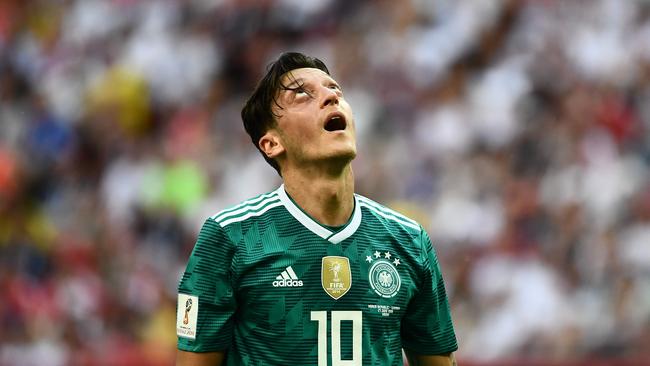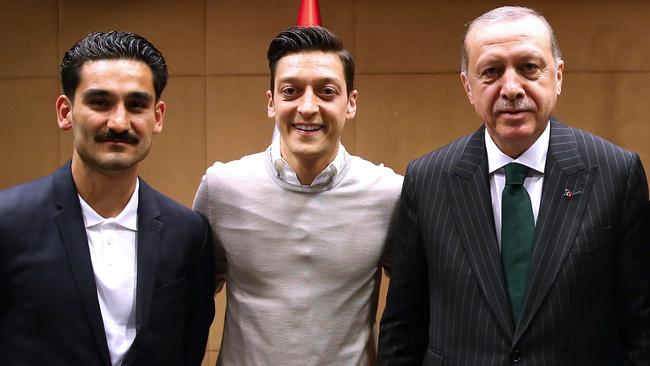Europe migrant crisis: German football Mesut Ozil stirs new debate
A fierce debate about identity and integration is escalating in Germany after the shock retirement of a star footballer due to “racism”.

A fierce debate about identity and integration is escalating in Germany following the resignation of an ethnic Turkish soccer star from the national team over what he deemed “racism and disrespect.”
Mesut Ozil, born in Germany to Turkish immigrant parents, was one of the most prominent players in a celebrated national squad that won the 2014 World Cup. His decision to quit, laid out on Twitter on Sunday evening, is dominating national news, reflecting the tension gripping the country since the 2015 migration crisis brought one million asylum seekers to Germany and fuelled a surge in far-right politics.
Germany’s soul-searching coincides with a wider discussion sparked on the soccer field about what it means to be European, notably in France, where a team of players of mostly immigrant origin sailed to victory in this year’s World Cup.
The 29-year-old soccer star, who also plays for England’s Arsenal team, accused soccer authorities and some media and politicians of racism after facing months of criticism for meeting Turkish president Recep Tayyip Erdogan, a controversial figure in Germany because of his crackdown on political opponents.
Mr Ozil and fellow player Ilkay Gundogan met Mr Erdogan in May at a hotel in London for a photo session in which they gave their jerseys to the Turkish leader. Mr Gundogan, also a German citizen, wrote on his jersey “for my president, with great respect.” The meeting took place during the campaign for June general elections in Turkey.
It ignited a heated discussion about the loyalty of national team players with immigrant roots, spilling over into a broader debate in the country of 82 million — including more than three million Turks — about the role of Islam and whether immigrants can be truly German. Top politicians have embraced migrant communities in recent years, but Chancellor Angela Merkel’s decision to open the doors to thousands of asylum seekers has ratcheted up tensions.
Mr Ozil had been the subject of a similar, if less heated, controversy when he refused to sing the German national anthem on the soccer field.

“I have two hearts, one German and one Turkish … for me, having a picture with President Erdogan wasn’t about politics or elections. It was about me respecting the highest office of my family’s country,” Mr Ozil wrote in his Twitter statement.
He said politicians and commentators were expressing their “previously hidden racist tendencies” and added that he would have such a picture taken again. “Whether it had been the Turkish or the German president, my actions would’ve been no different,” Mr Ozil wrote.
The soccer star also poured vitriol on one of his sponsors, the car maker Daimler AG, which, he said, withdrew its support in the aftermath of the scandal. Daimler said it was looking into the allegations.
But his harshest criticism was reserved for Reinhard Grindel, the president of the German football association or DFB, which is in charge of the national team.
“In the eyes of Grindel and his supporters, I am German when we win, but I am an immigrant when we lose,” he wrote.
The past couple of weeks have given me time to reflect, and time to think over the events of the last few months. Consequently, I want to share my thoughts and feelings about what has happened. pic.twitter.com/WpWrlHxx74
— Mesut Özil (@MesutOzil1088) July 22, 2018
DFB said it regretted the resignation but rejected the claims of racism.
Mr Ozil’s statement echoed a June complaint by the Belgian soccer star Romelu Lukaku, who said that when he was winning the press referred to him as a “Belgian striker,” while when the team lost he was described as a “Belgian striker of Congolese descent.”
Political reaction to Mr Ozil’s decision was divided. A spokesman for Ms. Merkel, who appeared in a widely distributed photo with Mr Ozil following the 2014 World Cup victory, said she “appreciates him very much.”
“Mesut Ozil is a great player and his decision must be respected,” the spokeswoman said.
But others were more critical. “With all respect for the family roots, national players must be ready to accept criticism when they allow themselves to be used for election campaigning,” said the German government’s integration commissioner Annette Widmann-Mauz.
Cem Ozdemir, the most prominent ethnic Turkish politician in Germany and former leader of the Green Party, levied criticism on both sides.
“Ozil’s photo remains wrong and his explanation is unconvincing,” he tweeted. But “Grindel is tearing to pieces our integration success. Do they want young German Turks to play for Erdogan soon?”
Germany and Turkey have been locked in a diplomatic dispute since Berlin rejected Mr Erdogan’s bid to hold election rallies in the country. The majority of Turks in Germany who voted in recent polls supported Mr Erdogan.
Turkish Justice Minister Abdulhamit Gul congratulated Mr Ozil on his resignation, which he deemed “the most beautiful goal against the fascist virus.”
WSJ



To join the conversation, please log in. Don't have an account? Register
Join the conversation, you are commenting as Logout